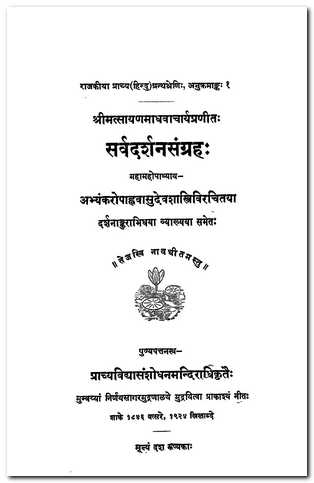 In Sarva-darsana-sangraha the author successively passes in review the sixteen philosophical systems current in India in 14th century CE, and gives what appeared to him to be their most important tenets, and the principal arguments by which their followers endeavoured to maintain them. In the course of his sketches, he frequently explains at some length obscure details in the different systems.
In Sarva-darsana-sangraha the author successively passes in review the sixteen philosophical systems current in India in 14th century CE, and gives what appeared to him to be their most important tenets, and the principal arguments by which their followers endeavoured to maintain them. In the course of his sketches, he frequently explains at some length obscure details in the different systems.
The systems are arranged from the Advaita-point of view. They form a gradually ascending scale-the first, the Charvaka and Buddha, being the lowest as the farthest removed from Advaita, and the last, Sankhya and Yoga being the highest as approaching most nearly to it.
The author, Madhavacharya or Madhava Vidyaranya (not to be confused with Madhvacharya, propounder of Dwaita philosophy) was an exponent of the Advaita school of philosophy in Hinduism. He is said to be the brother of Sayanacharya who wrote a commentary on the four Vedas.
The present translation was originally published serially in the Banaras Pandit between 1874 and 1878 and was carefully revised and republished in book form later and a second edition was printed in 1894.
Table of Contents
Preface
A Not on Romanization
The Sarva-darsana-sangraha
The Prologue
The Charvaka System (E. B. C.)
The Buddha System (A. E. G.)
The A rhata or Jaina System (E. B. C.)
The Ramanuja System (A. E. G.)
The Purna-prajna System (A. E. G.)
The Nakulisa-Pasupata System (A. E. G.)
The Saiva System (E. B. C.)
The Pratyabhijna or Recognitive System (A. E. G.)
The Resesvara or Mercurial System (A. E. G.)
The Vaiseshika or Anulukya System (E. B. C.)
The Akshapada or Nyaya System (E. B. C.)
The Jaiminy System (E. B. C.)
The Paniniya System (E. B. C.)
The Sankhy System (E. B. C.)
The Patanjala or Yoga System (E. B. C.)
The Vedanta or System
APPENDIX : On the Upadhi (E. B. C.)
DOWNLOAD English Translation
DOWNLOAD Sanskrit Text with Commentary
Aap ne sanatan dhama ka upkar kiya .
Bhagvan sri Chandramaooliswar aap ko mukti pradan kare prarthana karata hun .
Pratinidhi –
Sri sankaracharya swamigal .
Branch -Sri kanchi kamkoti pttam .
Jodhpur ,Rajasthan .Bharat .
KOTI-2 DHANYAVAD
pl send me all news about new book which u have published
Dear Sir,
I need
1. Tattvasangraha by Shantarakshit in Sanskrit/Hindi,
2. Syadvadamanjari in Sanskrit with Hindi Translation,
3. Isvarapratyabhijna in Sanskrit with Hindi Translation,
Can you help me?
sir namaste
I need vidyaranya yateenaaM all works
can you help me ?
Thank you
Mahabala Rao,
I will try to help you, if you provide a list of works of Vidyaranya Yati.
pl. send me list of book.for perchess
sri man g
kya aap mujhe ras parkash sudhakar or ras ratanakar ridhi khand kitabo k bare me jankari uplabdh karwa sakte h kirpya meri madad kare
dhanyavaad
Dear Sir
I am an advocate and law book author for AIR Nagpur.
Presently I am engaged in writing a book in which I wish to project and popularise ‘Mimamsa’ rules of interpretation in the modern Indian legal system. I have seen “Shree jaimini Praneete Mimamsa Darshane” in the Asiatic Society, Mumbai. It is a comprehensive work and I would like to have a copy for my reference and research. It would help me enormously if a Hindi or English translation is available. can you please help me? I am willing to come down to Pune for this.
Truly,
Verma, ph: 022-22844960/09430954439
Dr Verma, You can download Jaiminisutra with English Translation from the following link. It was published in 1923 from Allahabada as part of a reputed series “Sacred Books of the Hindus”.
https://archive.org/download/Sacred_Books_of_the_Hindus/SBH%2027%20-%20Mimamsa%20Sutras%20of%20Jaimini%20English%20Translation%20-%20Mohan%20Lal%20Sandal%201923.pdf
Good, namaskaram
हरी ॐ, आचार्यजी, में बम्बई में MA with योगशास्त्र का अध्यन कर रहा हु, मुझे अगर गुजराती में “सर्व दर्शन संग्रह” माधवाचार्यजी का ट्रांसलेशन /बुक हो तो भेजनेके लिए बिनती । धन्यवाद
very nice service is offered by your grace. many a thank by heart.
I want sarvadarshanasangraha text with english translation.
Himadri, Giving below link to Sarvadarsanasangraha with English translation.
https://archive.org/details/in.ernet.dli.2015.139630
Is there a translation of sarva darshna saMgraha to Kannada or Hindi or English (in that order of priority) by an Indian scholar rooted in veda vaNgmaya ?
Giving below links to Sarvadarsanasamgraha with Hindi translation by Govinda Suri & Umashankar Sharma.
https://archive.org/details/SarvaDarsanaSamgrah.of.Madhavacharya
https://archive.org/details/HindiSarvaDarshanSangrahaUmashankarSharmaRishi_201709
sarvadarshan samgraha in bengali.please give me a link..
I couldn’t download english translation. The link is not working. Kindly help me to get it. Thank you.
I checked the download link. It is working. In case you have difficulty in downloading, you may use the direct link given below.
https://archive.org/download/sarvadarsanasamg035018mbp/sarvadarsanasamg035018mbp.pdf